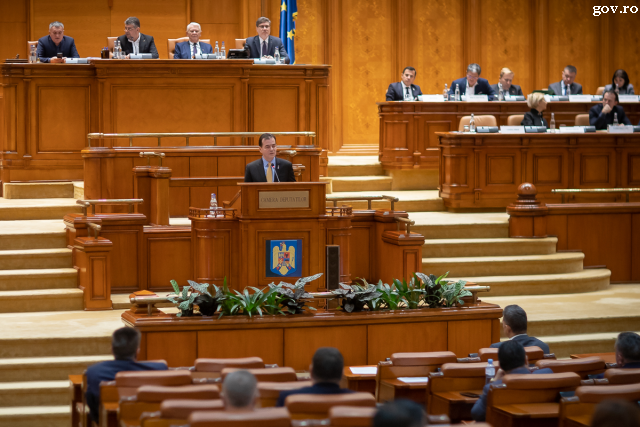Government seeks vote of confidence to pass new legislation and reactions
The political establishment reactions to Romanian government's seeking to pass three bills by asking Parliament for a vote of confidence.

Ştefan Stoica, 13.12.2019, 14:00
Pressured by
time and faced with a fragile situation in Parliament, the Liberal minority
cabinet in Bucharest has asked Parliament for a vote of confidence on three bills
referring to postponing the introduction of plans to increase the seniority in
office before entering the magistracy, measures in the field of passenger
transport and the budget caps for next year’s spending.
It’s the
healthiest way to pass legislation at the moment, explained the Senate’s
Liberal speaker Alina Gorghiu. She says the Ludovic Orban cabinet is thus
playing with its mandate on the table and the stakes are huge. While the
People’s Movement Party views the government’s move as fair and legal, the
Democratic Union of Ethnic Hungarians in Romania regards it as highly
irregular, and the Alliance of Liberals and Democrats hopes the government
will not resort to such a solution again. The Save Romania Union also says the
state budget bill should be passed by Parliament and not through a process that
involves a vote of confidence in the government. Pro Romania views the
government’s move as a means of testing its majority in Parliament.
Prime minister
Orban used the opportunity of his presence in Parliament and the discussion
about the budget to warn about the country’s extremely difficult financial
situation. He called for moderation and said next year’s budget did not support
additional expenses. Ludovic Orban:
Romania’s
budget for 2020 does not support any additional expense. Any additional expense
resulting from the passing of legislation will lead to an increase in the
deficit level or will make it impossible to make expenses that are vital for
Romania’s economic development.
The government
aims at a budget deficit level of 3.6% of the GDP next year and of 3.34% in
2021. Passing legislation by asking Parliament for a vote of confidence
involves the risk of a no-confidence motion against the cabinet. The Social
Democrats’ interim president and speaker of the Chamber of Deputies Marcel
Ciolacu has said, however, that his party is not contemplating this
possibility. Despite this, two of the bills proposed by the government will not
be able to come into force because the Social Democratic Party says it will
challenge them in the Constitutional Court. The two bills refer to postponing plans
to increase the seniority in office required to enter the magistracy and the
initiative referring to school transport. Marcel Ciolacu:
The Social
Democratic Party has decided to file a challenge in the Constitutional Court because
we believe the fact that a bill that is being debated in Parliament should also
be passed by government’s asking for a vote of confidence gives rise to a legal
conflict.
Prime minister
Ludovic Orban says the move was necessary to allow the judicial system to run
smoothly. With regard to the second bill challenged by the Social Democratic
Party, the prime minister said a law was needed to repeal a piece of
legislation that affected the transport of vulnerable categories, including
children, who would no longer benefit from the subsidy of their school
transport fare.






























